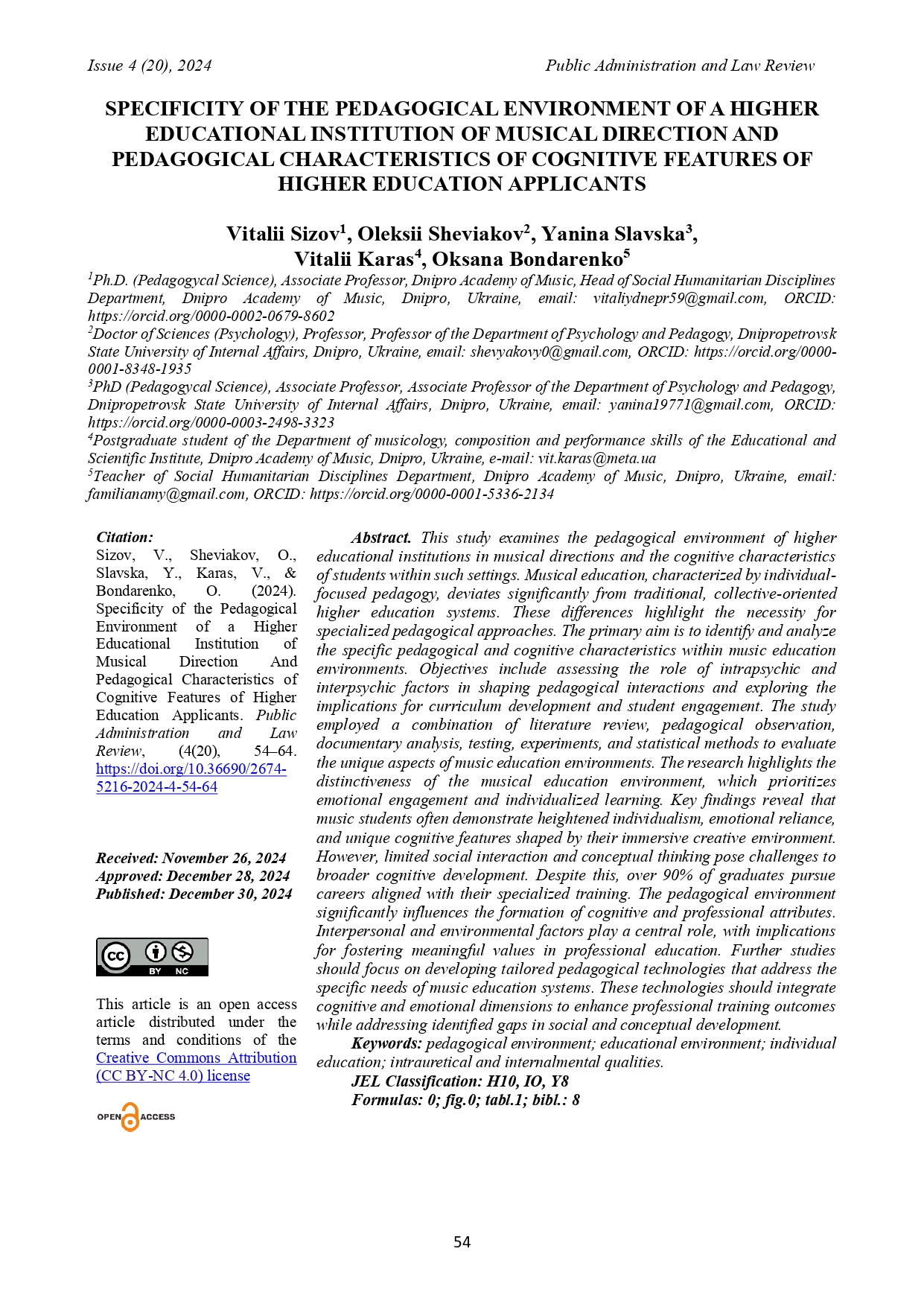SPECIFICITY OF THE PEDAGOGICAL ENVIRONMENT OF A HIGHER EDUCATIONAL INSTITUTION OF MUSICAL DIRECTION AND PEDAGOGICAL CHARACTERISTICS OF COGNITIVE FEATURES OF HIGHER EDUCATION APPLICANTS
DOI:
https://doi.org/10.36690/2674-5216-2024-4-54-64Keywords:
pedagogical environment, educational environment, individual education, intrauretical and internalmental qualitiesAbstract
This study examines the pedagogical environment of higher educational institutions in musical directions and the cognitive characteristics of students within such settings. Musical education, characterized by individual-focused pedagogy, deviates significantly from traditional, collective-oriented higher education systems. These differences highlight the necessity for specialized pedagogical approaches. The primary aim is to identify and analyze the specific pedagogical and cognitive characteristics within music education environments. Objectives include assessing the role of intrapsychic and interpsychic factors in shaping pedagogical interactions and exploring the implications for curriculum development and student engagement. The study employed a combination of literature review, pedagogical observation, documentary analysis, testing, experiments, and statistical methods to evaluate the unique aspects of music education environments. The research highlights the distinctiveness of the musical education environment, which prioritizes emotional engagement and individualized learning. Key findings reveal that music students often demonstrate heightened individualism, emotional reliance, and unique cognitive features shaped by their immersive creative environment. However, limited social interaction and conceptual thinking pose challenges to broader cognitive development. Despite this, over 90% of graduates pursue careers aligned with their specialized training. The pedagogical environment significantly influences the formation of cognitive and professional attributes. Interpersonal and environmental factors play a central role, with implications for fostering meaningful values in professional education. Further studies should focus on developing tailored pedagogical technologies that address the specific needs of music education systems. These technologies should integrate cognitive and emotional dimensions to enhance professional training outcomes while addressing identified gaps in social and conceptual development.
Downloads
References
Burlakova, I., & Sheviakov, O. (2021). SOCIO-PSYCHOLOGICAL TECHNOLOGIES OF PROFESSIONAL HEALTH FORMATION. Public Administration and Law Review, (3), 54–64. https://doi.org/10.36690/2674-5216-2021-3-54
Ovcharenko, N.A.,Shramko, Ya.V. (2018). Muzichna osvita: philosophskyi, mystetsvoznavchyi ta pedagogichnyi nagolosy: monograhia [Music education: philosophical, art and pedagogical emphasis: monograph]. P. 299.
Prikhodko, V., Sheviakov, O., Burlakova, I., Slavska, Y., & Cherednichenko, O. (2023). DEVELOPMENT OF NON-PROFESSIONAL PHYSICAL EDUCATION AMONG STUDENTS: LITERATURE REVIEW OF PSYCHOLOGICAL AND PEDAGOGICAL SUPPORT. Public Administration and Law Review, (4), 57–69. https://doi.org/10.36690/2674-5216-2023-4-57-69
Sheviakov, O., Kornienko, V., Burlakova, I., & Slavska, Y. (2022). SPECIALIST IN PHYSICAL TRAINING: ESSENTIAL CHARACTERISTICS. Public Administration and Law Review, (4), 67–74. https://doi.org/10.36690/2674-5216-2022-4-67
Sinyavskyi,V.V., Fedoroshin,V.A.(2010). Komunikativnye i organizatorskie sklonnosti [Comunication and organizational skills]. Retrieved from https://dip-psi.ru/psikhologicheskiye-testy/post/test-kommunikativnye-i-organizatorskie-sklonnosti-v-v-sinyavskij-v-a-fedoroshin-kos
Sizov,V.V. (2024). Kulturnyi arhetip ta divergentsiya osvity: monographia [Cultural archetype and divergence of education: monograph]. P. 344.
Vygotskyi L.S. (1934). Myshlenie i rech [Thinking and speech. Psychological research edited and with an introductory article by V.Kolbanovsky]. P. 326.
Zavalko, K.V. (2021). Spriamovanist suchasnoy muzichnoy pedagogiky v osvitnih zakladah Ukrainy [The direction of modern music pedagogy in educational institutions of Ukraine]. Retrieved from https://mmod.kubg.edu.ua/index.php/journal/article/view/223.

Downloads
Published
How to Cite
Issue
Section
License

This work is licensed under a Creative Commons Attribution-NoDerivatives 4.0 International License.





